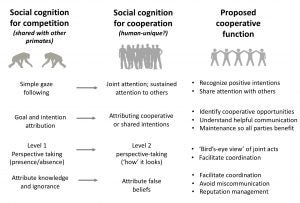Bettle, R. & Rosati, A.G. (2021). The primate origins of human social cognition. Language Learning and Development, 17: 96-127
[PDF] [Publisher’s version] AbstractThe ability to understand the mental states of other individuals is central to human social behavior, yet some theory of mind capacities are shared with other species. Comparisons of theory of mind skills across humans and other primates can provide a critical test of the cognitive prerequisites necessary for different theory of mind skills to emerge. A fundamental difference between humans and non-humans is language: while language may scaffold some developing theory of mind skills in humans, other species do not have similar capacities for or immersion in language. Comparative work can therefore provide a new line of evidence to test the role of language in the emergence of complex social cognition. Here we first provide an overview of the evidence for shared aspects of theory of mind in other primates, and then examine the evidence for apparently human-unique aspects of theory of mind that may be linked to language. We finally contrast different evolutionary processes, such as competition and cooperation, that may have been important for primate social cognition versus human-specific forms of theory of mind. We argue that this evolutionary perspective can help adjudicate between different proposals on the link between human-specific forms of social cognition and language.



